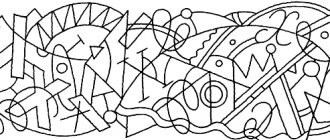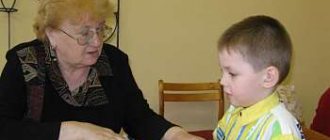The speech therapist assigns homework. Why and how?
Natalya Meshalkina
The speech therapist assigns homework. Why and how?
I present to the attention of my fellow teachers a consultation for parents, designed in the form of a screen using a template on this site. The material is purposefully presented in the most accessible (somewhat ironic) and concise form with a minimum of terminology, so that parents read without losing interest and understanding what they read.
Parents are increasingly surprised that the speech therapist asks to bring a notebook for homework, writes exercises in it, asks to take this notebook home every Friday and do everything.
For what?
After all, the child has already entered a speech therapy group, which means that all his speech problems will be solved by specialists automatically.
And so a speech therapist works with children several times a week, and teachers also practice speech skills in a group. They will teach him to speak correctly and prepare him for school.
And organizing classes with a child at home is very difficult.
It is necessary to find time after a difficult work week, on a legal day off, to sit down with your child at the table, open a notebook, and then...
- exercises for fingers (you will get confused how to connect them,
- gymnastics for the tongue (it won’t take long to break your tongue,
- oral tasks on vocabulary and grammar (these words scare me from school,
— games for correcting sound pronunciation (whoever pronounces this is already a hero).
The speech therapist also often asks you to draw or paste pictures on a topic into your notebook. But we don’t know how to draw, we don’t have a printer, it’s a shame to cut magazines and books, and we’ve run out of glue...
And the child whines and refuses not only to sit and move his tongue according to the instructions, but generally closes his mouth and clenches his teeth!
In general, it’s just torment, not learning!
Probably, the speech therapist is simply lazy: he doesn’t want to work with the child, he shifts his work onto the parents’ shoulders.
However, the family and kindergarten work TOGETHER for the benefit of each child, and even the best speech therapist cannot cope with a speech disorder, especially a severe one, alone.
Only with the joint and systematic work of a speech therapist and parents will a child learn to use the assigned sound in independent speech, stop making grammatical errors and will delight parents and others with beautiful speech.
Effective memorization and consolidation of speech material is possible only by repeating it many times in the garden and at home. Therefore, if homework is assigned and completed regularly, then we quickly get positive and lasting dynamics in the child.
At the same time, the speech therapist also spends his time developing a general and individual task for each child, searching for interesting material and pictures, then printing everything out, cutting it out, pasting it, distributing it to groups, taking it from the groups and checking it. This definitely doesn’t look like laziness and unwillingness to work.
A notebook with homework is a dialogue with parents, introducing them to what a speech therapist does with a child, what topic they are covering, what they need to pay special attention to.
This is why homework notebooks are needed.
Briefly about HOW to complete the tasks.
1. The main mistake parents make is to do tasks with their kids, like at school, at a desk.
But these are BEFORE schoolchildren. Life for them is a game, and the game is life.
And at home we play with children with fingers, with tongues, with words, we pretend to be monkeys, echoes, we help a bunny, a hedgehog, etc.
Enjoy the game and the quality time spent together.
2. A common mistake parents make is to complete tasks for their child.
Help your child - but don't do the work for him. He won't learn anything unless he tries and makes mistakes.
Even if he glued it crookedly or drew it unevenly, he did it himself!
3. Also, you don’t need to do everything at once.
A child with speech problems gets tired very quickly. It seems to us that all this is easy, but for him it is difficult work.
Take breaks, go for a walk, drink tea, etc.
4. Scolding or mocking mistakes and failures will forever discourage you from studying.
Praise your child for every achievement, even the smallest one. He is just learning, and in general – your favorite hero!
Every Friday we look forward to:
We are eagerly awaiting the notebook from the speech therapist.
After all, we can boldly show each other our tongues!
Let's learn the poems and show them on our fingers!
Speech therapy homework “Our fun summer”
(For children of senior preschool age attending a speech therapy group)
Summer is the most wonderful and fun time of the year. The most favorable period for parents and children to spend time together. Child development continues in the summer and does not stop. At this time of year, he receives a large number of positive emotions and vivid impressions. His motor activity increases. This period can be used to consolidate the knowledge acquired this academic year. Let's work together to make this time interesting and useful.
General speech underdevelopment is a complex defect, the correction of which requires considerable effort on the part of speech therapists, educators and, of course, parents.
In order for our joint work not to be lost during the summer, I offer you exercises that do not require special training and you can perform them in any environment (at home, while walking...). And remember the main thing - we are not engaged! We play! But every game has its own rules! And ours is no exception. The first rule is a positive attitude and good mood of the child. The second rule is to exercise no more than 15-20 minutes a day. Frequency: 2-3 times a week.
The main thing is that you shouldn’t complete all tasks at once. One day you can come up with a story about a little frog that you saw (Where is the little frog jumping; why is he jumping; who did he meet on his way...) on another day, count all the blue (white, red) objects that you see in speech therapy (one blue car, two blue cars, three blue cars, four blue cars, five blue cars).
1. Exercises for automating sounds.
General recommendations: Keep an eye on the sounds that have already been delivered this year. Ask your child to say the sound correctly if he distorts it. If this is not done, the distorted pronunciation of the sound will “return” and we will have to start all the work again.
2. Exercises for the development of phonemic processes
- Determine where the sound is coming from (top, bottom, right, left...)
— Game “Drummer” We invite children to listen to the rhythm and tap it.
* short knock; - long knock.
Examples of rhythms:
**-**- **— ** —***— *-*-*- *—*—*—
— Game “Mom - Baby”
We explain to the child that the mother is now a baby, and he is the mother. Now he will explain how to pronounce words correctly. Mom pronounces words, making mistakes and replacing sounds. The child's task is to correct his mother.
— Game “Repetition”
We ask the child to repeat a couple of syllables after you (we do not use sounds that the child pronounces incorrectly). For example: pa-ba; date of; ma-na; ka-ga; boo-moo; would -we; poo-too; ku-gu; whoa;….
— We repeat the letters studied this school year.
A O U E Y I T K P M
We can see and write . And also lay out from sticks, pebbles, twigs... Letters (sounds) can be vowels (the air does not meet obstacles) and consonants (the air encounters an obstacle - the tongue, teeth, lips). Consonants can be hard or soft.
We remember that we can hear and pronounce .
3. Games for the development of lexical and grammatical categories of language and coherent speech
— Game "Count"
Please count the objects using numerals. For example: one flower, two flowers, three flowers, four flowers, five flowers. Let's complicate it with adjectives. One white flower, two white flowers,... five white flowers.
— Game “One-many”
For example: one beetle - many beetles; many butterflies - one butterfly. You don't have to use the word "a lot." For example, garden-gardens, berries-berries.
- Game "Giant Dwarf".
The adult “giant” names any object, and the child “gnome” must say the diminutive form of this word.
Window-window; leaf-leaf; sun-sun.
— Game “Greedy”
The child goes and “gets greedy.” Everything he sees, he must say mine, mine, mine. For example: my sun, my wind, my rainbow, my cloud...
— Game “Mother-Baby”
Mom says:
-I am now a mother cat, which means you are my baby. Who are you? (Kitten.) I am now a mother duck. Who are you? (Duckling). You can repeat wild and domestic animals. Dads can play too. If dad is a drake, then who is his son (daughter)?
— Game “Lost”
We take things, objects that belong to someone and ask:
- Whose is this? (Mom’s dress, dad’s phone, grandma’s bag...) and we can also pay attention to objects on the street.
- Whose car? (uncle); whose bike? (Machin).
— Game “What from what”
We invite the child to determine what this or that object is made of. For example: The bucket is made of iron. What bucket? The child must give a complete answer using a noun and an adjective. (Iron bucket.)
— Game “Knowledge”
Invite your child to continue the phrase “I know 5 items of clothing...” 5 wild animals..., 5 foods..., 5 colors...
In conclusion, I want to tell you. Wherever you are in the summer, communicate with your child.
You came to the sea - choose words for the word “water” - What kind? (warm, cold, salty); “sand” Which one? (yellow, white, wet, dry); “pebbles” What? (Smooth, wet, small, large.) Consider the nature around you. How is it different from ours?
You find yourself in a village - look at what animals and birds are around. Remember their name, the name of their cubs. Help your child write a descriptive story about a pet. Consider what is growing in the garden. What kind of equipment and tools can be seen in the village. What are they needed for.
You spend the summer in the city. Walk more often. Analyze the houses around you. Write a story about buildings such as a school, kindergarten, clinic, store. What buildings are these? (New, old, modern, ancient, high, low, single-story, multi-story.) What are they for? Who works in these buildings?
Communicate, play, tell stories, teach, study, invent, and don’t just be nearby. By following these tips you will certainly see the fruits of your labor.
I wish you a pleasant summer holiday!






